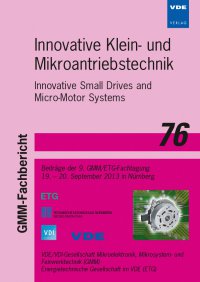Reducing Magnetic Noise of an Auxiliary Water Pump Drive
Conference: Innovative Small Drives and Micro-Motor Systems - 9. GMM/ETG-Fachtagung
09/19/2013 - 09/20/2013 at Nürnberg, Deutschland
Proceedings: Innovative Small Drives and Micro-Motor Systems
Pages: 6Language: englishTyp: PDF
Personal VDE Members are entitled to a 10% discount on this title
Authors:
Koenig, Tilo; Wilharm, Torsten (Robert Bosch GmbH, Bühl, Germany)
Abstract:
To accelerate and simplify the process of developing quiet electric motors, it is advantageous to combine classical analytical methods with numerical approaches. To achieve this, it is important to understand the physical interactions which are taking place. In the work presented here, analytical methods are used and finite element (FE) analysis is only carried out when really necessary, in order to minimize the calculation time. Furthermore all influences can be analyzed separately or together, so that the designer has a clear view of the physics behind, and the relationship between the electromagnetic field, force excitations, structural response and noise excitation. When applying this method, the magnetic noise excitation of a motor is reduced significantly. To achieve this, the stator stiffness is increased and resonances are avoided. The rotor field is formed by shaping the rotor lamination and magnets, and the current is shaped to form the stator field excitation. The mechanical design is improved in terms of dimensional accuracy, especially for air-gap related dimensions, to reduce the distortion of the resulting air-gap field. In summarizing, the electric, magnetic and geometric influences are matched to minimize the force excitation and structural response. Within a short time, the airborne noise of an auxiliary water pump was reduced significantly when using this method.


